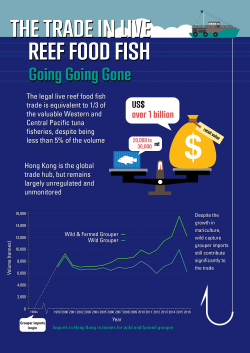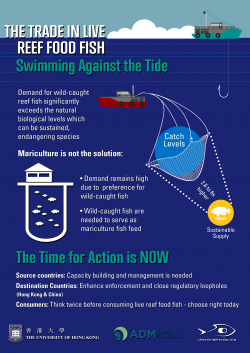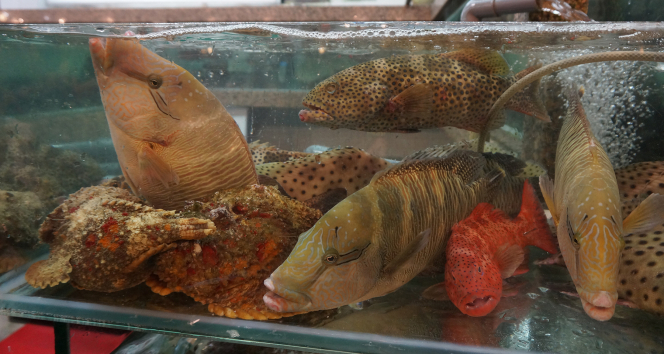Media
New study sheds light on the the dark side of Hong Kong’s most lucrative seafood trade
01 Feb 2018
(From left) Mr Stan Shea, Marine Programme Director, BLOOM Association Hong Kong; Professor Yvonne Sadovy, Professor, School of Biological Sciences and Swire Institute of Marine Science, HKU; Professor Daniel Pauly, University of British Columbia Killam Professor, Sea Around Us Project; Institute for the Oceans and Fisheries & Department of Zoology
Hong Kong is the global hub for the more than USD 1 billion Live Reef Food Fish Trade (LRFFT), much of it unreported and unregulated with serious consequences for vulnerable species, food security and livelihoods in Southeast Asia, according to a report released today (February 1).
Published jointly by the Swire Institute of Marine Sciences at the University of Hong Kong (HKU), ADM Capital Foundation and the WWF Coral Triangle Program, the report, Going, Going Gone: The Trade in Live Reef Food Fish, says popular wild-caught reef fish species could be gone from diners’ tables within our lifetime if we do not act now to stem this burgeoning and often illegal trade.
“The rate at which we are taking reef fish from our oceans, including juveniles, is simply not sustainable,” said Dr Yvonne Sadovy, a professor of biological sciences at HKU and lead author of the report. “The LRFFT is symptomatic of the pressure being put on these fish resources and the potentially devastating effects on livelihoods. As the epicentre of the LRFFT, it is critical Hong Kong takes steps to regulate before it is too late.”
Live seafood is part of the culinary tradition of southern China, with most species coming largely from the seas of Southeast Asia. Demand for these attractive and increasingly rare fish species, eaten mostly at banquets and as displays of wealth, has grown with expanding affluence in Mainland China.
Although the trade is not large by global fisheries standards, it is disproportionately valuable, estimated between 20,000 and 30,000 metric tonnes (mt) annually in the trade hub of Hong Kong, and valued in excess of USD 1 billion, according to the report. This does not count illegal trade. The trade supplies a luxury seafood market with high retail value fishes, with some species, such as Napoleon fish, fetching in excess of USD 600 per kg.
The legal LRFFT represents almost one-third of the valuable Western and Central Pacific tuna fisheries, despite being less than 5% of the volume of those fisheries.
“The real value of the trade, however, is unknown since much is traded illegally, on a black market,” said Dr Geoffrey Muldoon, Senior Manager with the WWF Coral Triangle Program, and co-author of the report. LRFF volumes imported into Hong Kong are being underestimated, perhaps by as much as 50%, because of inadequate monitoring of the trade, particularly imports by sea, and deliberate misreporting, the report said.
“Traders, transport and logistics carriers are allowed to exploit a vacuum created by inadequate and outdated regulation, loopholes in the law and lax enforcement of live seafood trade into, within and through Hong Kong,” added Dr Muldoon.
“Governments are likely not benefitting as they should from this valuable trade because of the culture of deliberate tax avoidance, poor governance, and lack of transparency in the marketing and transport of live fish,” said report co-author Sophie Le Clue, environment program director at ADM Capital Foundation.
The LRFFT should be providing ‘sustained’ income along the trade chain, from fishers and their communities to exporters, transporters, importers and retailers, but because of the secretive and exploitative nature of the trade, those potential long-term benefits are being lost, she said.
According to the report, 15 to 20 species of reef fishes, largely groupers, supply the LRFFT from both wild populations and farmed sources with the major source countries currently being Indonesia and the Philippines, Thailand, Malaysia, and to a lesser extent Australia.
Many of these species are biologically vulnerable to fishing pressure, being long-lived and late to sexually mature. Persistent overexploitation, where catch levels have outstripped natural reproduction rates by between two-and-a-half and six times, has threatened some species. Napoleon (or Humphead) wrasse stocks, for example, have been devastated in some areas future livelihoods ruined by overexploitation of this species, according to Dr Sadovy. Other species threatened by the trade are the Camouflage, Tiger and Squaretailed groupers. Concern is also growing for the Coral Trout.
Although mariculture is supplying an increasing portion of the trade and driving the growth in imports, the report emphasised that this will not help reduce trade impacts on wild fish populations; mariculture can even increase overfishing due to the reliance on wild juveniles for grow out of species such as Coral Trout that cannot be hatchery-produced in commercial quantities and the dependence on wild fish for their feed. Also, consumers still have a preference for ‘wild’ fish which are also the most economically valuable for traders. All of these factors point to unrelenting pressure on wild stocks, Dr Sadovy noted.
The report includes many recommendations to protect our vulnerable species and their reefs. For Hong Kong these include that authorities must work to stop illegal, unregulated and unmonitored trade, by updating laws on the import of live fish, improve vessel reporting and traceability, better monitor and control of cargo/live fish carriers, and better oversight of fish cargo vessel entry/exit.
For traders and retailers, traceability is paramount if the trade is to supply legal fish to consumers into the future, and to ensure sustainable sourcing, the report said. Retailers should ensure, for example, that the Napoleon fish they buy is legal.
Finally, as Chinese New Year is fast approaching, consumers may wish to give consumption of live reef fish a second thought, the report authors said. The WWF-Hong Kong Seafood Choice guide has suggestions for sustainable options.
“We are not talking about not eating fish at all. What we are talking about is not eating so many wild fish that we destroy their populations,” Dr Sadovy said. “We need to know where seafood comes from, that it’s legally sourced, safe to eat, and that it is sustainable”.
For the powerpoint slides presented at the media briefing.
For an executive summary of the Going, Going Gone: The Trade in Live Reef Food Fish report
The Going, Going Gone: The Trade in Live Reef Food Fish report (Vol. 1)
The Going, Going Gone: The Trade in Live Reef Food Fish report (Vol.2)
ABOUT THE UNIVERSITY OF HONG KONG
The University of Hong Kong (HKU) is the first and oldest institution of higher learning in Hong Kong, and was founded in 1911, incorporating the Hong Kong College of Medicine (est. 1887). For over a century, the University has dedicated itself to creating knowledge, providing education, and serving society. It has grown with Hong Kong and generations of its graduates have helped shape the city from which the University takes its name. Today, HKU has an established worldwide reputation for being a research-led comprehensive University with ten Faculties and a strong commitment to intellectual freedom, liberty and diversity.
HKU strives to attract and nurture outstanding scholars through excellence and innovation in its teaching and learning, research and knowledge exchange activities. Regarded as Asia’s Global University, HKU is a diverse community of over 30,000 students, including about 9,000 students from more than 100 countries around the world, and half of its academic staff are international faculty. HKU’s research areas and themes reflect a broad range of issues and bring together experts from diverse disciplines. The University has academic partnerships with over 300 universities and research institutes around the world. The University has 111 professors ranking in the top 1% scientists globally and conducts cutting-edge work in many fields.
Media contacts:
Dr Yvonne Sadovy
Professor at School of Biological Sciences and Swire Institute of Marine Science, HKU
yjsadovy@hku.hk
Ms Melanie Wan
Communications and Public Affairs Office, HKU
melwkwan@hku.hk
Ms Cindy Chan
Faculty of Science, HKU
cindycst@hku.hk / (852) 3917-5286
ABOUT WWF CORAL TRIANGLE PROGRAMME
WWF has been pioneering conservation in the Coral Triangle for more than two decades, collaborating with partners in the private sector, governmental agencies and civil society. By providing technical expertise and funding, and promoting innovative public-private partnerships, WWF is committed to safeguard the health of the region’s natural resources and to secure the millions of livelihoods that depend upon them.
Media Contact:
Mr Geoffrey Muldoon
Senior Manager, Business and Industry, WWF
geoffrey.muldoon@wwf.panda.org
ABOUT ADM CAPITAL FOUNDATION (ADMCF)
Established in 2006, ADM Capital Foundation (ADMCF) aims to promote equity and environmental conservation in Asia. Through research, the foundation identifies environmental challenges and then works towards solutions across five key areas: marine conservation, water security, air quality, wildlife trade and forestry conservation finance.
ABOUT CHOOSE RIGHT TODAY (CRT)
ADMCF in 2016 launched ChooseRightToday.org as a bi-lingual platform to educate businesses and consumers about sustainable seafood, which is seafood captured or farmed in a way that minimizes harm to the marine environment. The site contains important up to date information on eco-labels, what to eat and what to avoid. It also provides a guide to Hong Kong’s major supermarkets, online stores and lists a wide selection of restaurants carrying sustainable seafood.
Media Contact:
Ms Sophie Le Clue
Director, Environment Programme, ADMCF
slc@admcf.org



